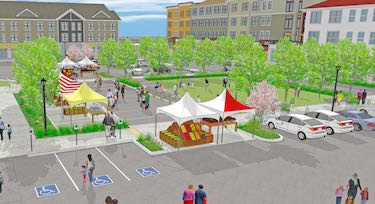Who is a member?
Our members are the local governments of Massachusetts and their elected and appointed leadership.
Mass Innovations, From The Beacon, April 2017

An artist’s rendering of the $4.75M North Square at the Mill District mixed-use project.
Amherst officials have signed off on the first project to receive the town’s first-in-the-state tax incentive program designed specifically to spur the creation of affordable housing.
The $47.5 million North Square at the Mill District mixed-use project will turn a former lumberyard into 22,000 square feet of commercial space and 130 apartments, with 26 of those apartments designated as affordable units for renters who earn 50 percent or less of the area median income.
Without the town’s tax incentive program, the project would generate an estimated $4.37 million in property taxes over the first 10 years. Under the new program, the town will collect just $1.57 million, while developer Beacon Communities will avoid an estimated $2.8 million in taxes.
The new program, approved by Amherst Town Meeting in 2015, allows the phasing in of assessed property value resulting from developments of residential or mixed-uses that include 10 or more residential units and with at least 10 percent of the units designated affordable for low- or moderate-income households.
The tax incentive program, according to Amherst Town Manager Paul Bockelman, is “really about taking future revenues for the town and investing that into creating more affordable housing in the community.”
Sandy Pooler, currently the deputy town manager in Arlington, served as Amherst’s finance director when the idea was being developed within Town Hall. After affordable housing consultant Judi Barrett of RKG Associates presented a report to the town with various options to boost its affordable housing, including the incentive program, former Town Manager John Musante ran with it, Pooler said.
“We all worked as a team to get it done, but it was really a credit to John’s vision,” Pooler said, adding that the town received support from attorney Joel Bard of KP Law, Rep. Ellen Story and Senate President Stan Rosenberg’s office.
With zoning maxed out for the town center and an inclusionary zoning bylaw already on the books, the town was having trouble finding more it could do with zoning to provide incentives to developers to provide affordable units, Pooler said. So Barrett was brought in to help.
“Outside of downtown Amherst, that’s probably most of the way you could do it – for every affordable unit you’re building, we’ll let you build another one and a half market rate units,” he said. “That wasn’t going to work downtown because the zoning wouldn’t allow you to build any bigger than you could ‘as of right.’”
Most of the state tax incentive programs available were focused on job creation, Pooler added, leading the town to explore other options and ultimately, with Musante’s leadership, to home in on a tax incentive for affordable housing creation.
“We said, ‘Why don’t we come up with a plan that helps at the beginning of a project, when we know developers typically have their biggest cash flow problems?’” he said.
The program is paid for by adjusting the valuation of the property over time, Pooler said, “so that it wasn’t hitting the other taxpayers in town, it wasn’t hitting the overlay.” By adjusting the assessed value of the property, the program still creates “new growth,” but not as much as would be the case without the incentive program.
Bockelman added that program design “doesn’t require an upfront investment” on behalf of the community.
“We’re still going to have a lot more revenue coming in from the site,” he said. “We have $15,000 coming from the site now with virtually no buildings. Even with the reduced revenue stream, it will bring in substantially more revenue than we have now.”
For more information, contact Amherst Town Manager Paul Bockelman at (413) 259-3002 or townmanager@amherstma.gov.